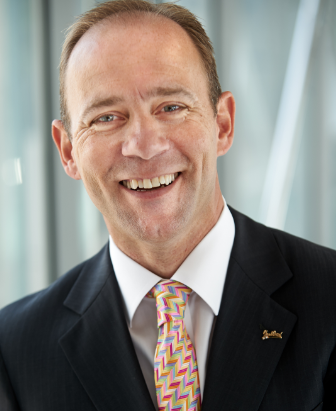Mark Willis, area vice president for the Middle East and Turkey at the Rezidor Hotel Group gives credence to the factors set to drive demand in 2016 and how personalised experiences will make waves in the year ahead.
January is an interesting time. We look forward to what has yet to come,  and we look back over what has passed. The challenges of 2015 seem far behind us and we’re entering a new year on the back of months of low oil prices and decreased currency values, and things can only go up from here. In fact, a report by Alpen Capital forecasts that the GCC’s hospitality industry is forecast to grow to S$35.9 billion by 2018 at an annual rate of 9.5%, and that’s certainly something for us all to look forward to.
and we look back over what has passed. The challenges of 2015 seem far behind us and we’re entering a new year on the back of months of low oil prices and decreased currency values, and things can only go up from here. In fact, a report by Alpen Capital forecasts that the GCC’s hospitality industry is forecast to grow to S$35.9 billion by 2018 at an annual rate of 9.5%, and that’s certainly something for us all to look forward to.
Growth in 2016 and for the foreseeable beyond will be driven by several factors. Personalisation is key amongst these, and it is becoming increasingly more achievable thanks to the industry’s digital transformation which is another factor propelling growth. Thanks to the integration of digital solutions, new corporate initiatives have been introduced to streamline processes, to communicate with guests before, during and after their stay, and to deploy more points of contact online, such as through review sites, internet bookings, and social media sites.
Personalisation used to be exclusive to the luxury hotel industry, but, as a result of the digital transformation, guests have come to expect a tailored experience wherever they stay and we are able to deliver. Digital technologies enable us to track consumer behaviour, which then allows us to create personalised guest experiences based on our anticipation of their needs. Information gleaned from Big Data makes this possible.
To draw upon experience from within the Rezidor Hotel Group, we have been able to position ourselves within the digital transformation shift with not only our core existing brands, Radisson Blu and Park Inn by Radisson, but also with the launch of our new offering, Radisson Red – a brand that targets the ‘millennial mindset’ by connecting their hotel wants and needs with the things they care for much. Because it is mobile and technology driven, Radisson Red is positioned to capture the millennials. This concept is especially well suited to densely populated urban settings with prevalent smart technology, such as we can see in several cities across the GCC region. The brand, similarly to its audience, is dedicated to be simple but true efficient and seamless but also young, in movement and active. We look at it as a social space where people gather and meet in the same way they now engage on social media. This shift is seen globally with the concentration of youth in mature market but especially in emerging countries where the growth rate of penetration of mobile usage is the highest among all.
With personalisation becoming a standard in 2016, we will start to see an increase in the search for authenticity. There is a burgeoning trend for sophisticated travellers to look beyond booking a stay in a venue that is merely convenient or budget-friendly. They are looking for iconic products in unique locations that both define the destination and have a story to tell. Traditionally, such venues are run as independent hotels. However, the disadvantages to these is that they lack the service quality, consistency, and often the vision of larger hotel operators – who have been seizing the opportunity by adapting to this model in order to tap into the potential of this segment. Carlson Rezidor Hotel Group’s Quorvus Collection was launched as an endorsement brand to regroup similar unique properties. The Quorvus Collection is designed to bridge the gap between the authentic experience of an independent hotel, with the reassurance of a trusted brand behind it.
Guests are also demonstrating an increasing trend towards wanting to choose hotels that echo their own vision of sustainability. With the great push towards this in the region, we can expect this to continue to be a strong tendency in the year to come. There has been an ongoing focus particularly on serving local and sustainably produced food items, and we encourage our hotels to make the most of the produce they have available on their doorstep to cut down on carbon footprint and support local producers.
Along these lines, I believe that we will continue the shift towards providing a healthier experience, both in terms of dining and well-being. In light of regional health issues, hoteliers should start to seriously consider providing not only balanced meal options, but nutritional information on all food and drink items to enable guests to make conscious dietary choices. It is also becoming increasingly important for guests to have access to wellness and spa offerings, especially so in Saudi Arabia where men in particular are keen to enjoy tailored wellbeing services.
As we move towards the region’s major events – the World Expo 2020 in Dubai, and the 2022 FIFA World Cup in Qatar – we will see momentum continue to pick up. This is something we saw in 2015, but the trend will gather pace in the year to come. Hoteliers should jump aboard the digital transformation, personalisation and sustainability trains to stay ahead of the curve when it comes to guest demands. After all, the ‘Yes I Can!’ attitude is key.



































































